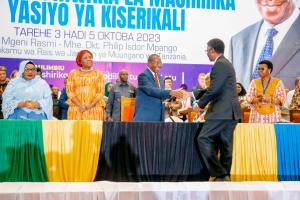WHO reiterates commitment to support CSOs to advance public health outcomes
Dodoma - The World Health Organization, Tanzania, has reiterated its commitment to support Civil Society Organizations (CSOs) which includes non-governmental organizations (NGOs), community-based associations (CBAs) and faith-based organizations (FBOs) to advance public health outcomes especially among the under-served and vulnerable populations.
At the 2023 Annual NGO Forum which was supported by WHO with funding from Canadian Government, WHO Representative to Tanzania, Dr. Charles Sagoe-Moses stated that partnership with CSOs has been a major pillar of WHO’s transformation to help the world achieve Health for All. “CSOs have a strong footprint in the communities that WHO serves, a holistic understanding of the people at the grassroot level are well positioned to reach missed communities, hard to reach areas and to generate demand for health services,” said Dr. Sagoe-Moses.
As a testament to WHO’s commitment to sustainable collaboration with CSOs, WHO Civil Society Commission was launched on 24th August 2023 to strengthen dialogue, foster collaboration and provide recommendations to support WHO on its engagement with civil society at global, regional and national levels to achieve health for all and to accelerate attainment of health-related SDGs.
Recently, WHO supported the Tanzanian Ministry of Community Development, Gender, Women and Special Groups to implement digital mapping of NGOs in the country to easily locate and categorize NGOs by location, scope, sector, capacity and priorities, by the click of a button, thereby bringing together organizations across a wide range of sectors and disciplines who have interest and a responsibility to reach and serve communities.
The Vice President of the United Republic of Tanzania, Dr. Philip Mpango, appreciated the contribution of the civil society in community development through implementation of various initiatives and projects across all sectors, particularly in health, agriculture, education, community empowerment and innovation among others. He reaffirmed the government's commitment to create a conducive working environment for the civil society in Tanzania through the development of several policies, guidelines, and systems over the years, as well as the introduction of NGO desks across ministries and presently, the launch of a digital mapping platform for NGOs.
Further he encouraged continued close collaboration between regional and district leadership and civil society. He highlighted the responsibility of international NGOs in building local capacity and encouraged engagement between these organizations, with a view to building local capacity and skills and achieving sustainability.
The event was attended by dignitaries, heads of missions and partners including the Minister of Community Development, Gender, Women and Special Groups, Hon. Dr. Dorothy Gwajima, Chairperson, NGOs Coordination Board, Hon. Mwantumu Mahiza, Deputy Head of Mission of the Embassy of Switzerland, H.E. Holger Tausch, representative of the European Union, H.E. Emilio Rosetti, and Chairperson of the National Council of NGOs, Dr. Lilian Badi.
